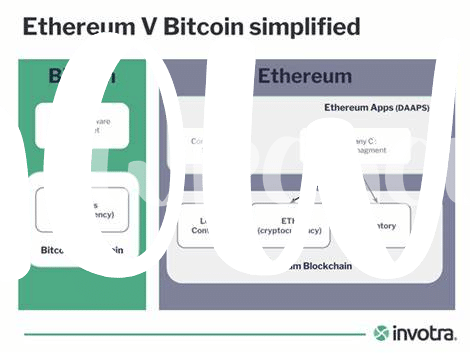🛡️ Ethereum Vs. Bitcoin: Understanding the Basics

Imagine two superheroes of the digital world: Ethereum and Bitcoin. They’re both stars in the universe of cryptocurrencies, but they have different superpowers. Think of Bitcoin as the gold standard – a pioneer that introduced the world to digital cash. It’s like the wise, trusted hero that showed us a new way to think about money. On the other side, we have Ethereum, a young wizard with a special talent for creating smart contracts – these are like magical agreements that automatically do what they promise, without needing a middleman. Pretty handy, right? Especially when you’re shopping online! Below is a simple table to break down their key differences:
| Feature | Bitcoin | Ethereum |
|---|---|---|
| Main Use | Digital Currency | Smart Contracts & DApps |
| Launch Year | 2009 | 2015 |
| What’s Special? | The first cryptocurrency, focusing on secure and anonymous transactions. | Enables not just currency transactions but also complex contracts and programs. |
So, while Bitcoin aims to revolutionize how we view and use money, Ethereum takes it a step further by transforming how agreements work in the digital world. Both are changing the game, but they play on different fields. Whether you’re sending money, buying online, or creating secure digital contracts, understanding these two heroes can give you the superpower of navigating the digital age with confidence.
🚀 Powering E-commerce: the Role of Smart Contracts
Imagine walking into a store where you can securely buy anything with just a handshake that seals the deal. That’s the magic smart contracts on Ethereum bring to online shopping. Unlike traditional agreements, these digital contracts lock in the terms between buyer and seller directly into code, automating trust and eliminating the middleman. It’s like having an invisible, super-efficient assistant who makes sure everyone sticks to their end of the bargain, making the entire shopping journey smooth and secure.
On the flip side, navigating the world of e-commerce demands a trustworthy system. Here, Ethereum shines by leveraging smart contracts to offer unparalleled security. Every transaction is not just a transfer of funds but also a binding agreement that self-executes and enforces the rules, all while keeping your data protected. For a deeper dive into Ethereum’s unique approach and how it stands head-to-head with Bitcoin in transforming the landscape of decentralized projects, check out https://wikicrypto.news/ethereum-vs-bitcoin-decentralized-projects-transforming-the-crypto-landscape. This technology isn’t merely a payment method; it’s reshaping what it means to shop securely online, offering peace of mind in every transaction.
🛒 Shopping Securely: Bitcoin’s Approach to Safety

When we talk about shopping online with Bitcoin, imagine it as using a super secure, digital piggy bank. Each time you pay, you’re using a key that only you have, to open your piggy bank and send money directly to the seller. There’s no middleman, like a bank or a credit card company, peeking into your transaction. This direct line from buyer to seller not only simplifies things but also beefs up security. 🛡️🔑
But it’s not just about the straightforward path your money takes. Bitcoin’s ledger, think of it as a public record book, keeps track of everything in a way that’s transparent yet super secure. Every transaction is confirmed and sealed by a network-wide agreement, which is like a group of vigilant neighbors making sure everything’s above board. This community watch approach helps in keeping your purchases safe and sound. 🌐🔍
🔒 Locked In: How Ethereum Protects Your Purchases

Imagine you’re shopping online, eyeing a pair of sneakers you’ve wanted for ages. You want to make sure your purchase is safe, that nobody can mess with it once you’ve paid. This is where Ethereum steps in, offering a kind of digital safety net for your transactions. Thanks to something called smart contracts, Ethereum adds a layer of protection to your online shopping. Think of these smart contracts as tiny, trustworthy robots that live inside the Ethereum network. They only spring into action when certain conditions are met—like confirming you’ve paid for those sneakers—ensuring the deal is sealed, fair, and tamper-proof. This tech isn’t just cool; it’s a game-changer for shopping online, making sure that what you buy is exactly what you get, without any funny business. Plus, for those curious about how Ethereum stacks up against Bitcoin in more ways, including their role in the future of e-commerce and other intriguing details, a peek at what you need to know about bitcoin halving events versus ethereum might shed some light. And while both cryptocurrencies offer their unique flavors of security, Ethereum’s smart contracts bring a level of assurance and transparency to e-commerce that’s tough to beat, making your global shopping spree not just more secure, but a lot more smooth.
💸 Transaction Tales: the Cost of Security
Imagine you’re shopping online, and each time you checkout, there’s a small fee. That’s a bit like the cost of security in the digital world of Ethereum and Bitcoin, where ensuring your transactions are safe has its price. 🛍️ With Ethereum, using those clever contracts for buying things might add a bit to your bill. That’s because they’re super smart, handling agreements all by themselves, but that smartness requires a bit of extra computing power, which adds up.
Now, with Bitcoin, it’s a different story. It’s more like paying at a traditional shop; straightforward, but still with a fee. These fees are not just random numbers but are carefully calculated to keep things running smoothly and securely. Let’s look at a simple breakdown:
| Cryptocurrency | Transaction Fee | Security Mechanism |
|---|---|---|
| Bitcoin | Varies (Low to Medium) | Blockchain Confirmation |
| Ethereum | Varies (Medium to High) | Smart Contracts & Gas Fees |
Both these fees play a crucial role in guarding your shopping against the bad guys, making sure that buying that new gadget or outfit online is as safe as possible. 🛡️ Just remember, the cost of security is a small price to pay for peace of mind in the vast online marketplace.
🌍 Global Shopping Spree: Accessibility and Ease of Use

In the vast world of online shopping, where borders fade and distances shrink, the ease with which you can click and buy from anywhere in the world is simply magical. Imagine buying a handmade rug from Turkey or spices from India with just a few taps on your screen. But what makes this global shopping spree smooth and accessible? Here’s where Bitcoin and Ethereum step in, each with its own charm. Bitcoin, with its widespread acceptance, acts like an old, trusted friend that many shops worldwide are happy to see. On the other hand, Ethereum brings smart contracts into the mix, making things like buying a car or house online as easy as downloading a song – secure and with a digital handshake to seal the deal. The true beauty lies in how these technologies break down the complex walls of international payments, making it feel like your local market is just a blink away. For those who are keen on diving deeper into how these two giants stack up, especially in the ever-evolving world of e-commerce, taking a peek at bitcoin market trends and investment analysis for 2024 versus Ethereum could offer a wealth of insights. These technologies aren’t just about making shopping easier; they’re about transforming how we think about buying and selling in our interconnected world.
